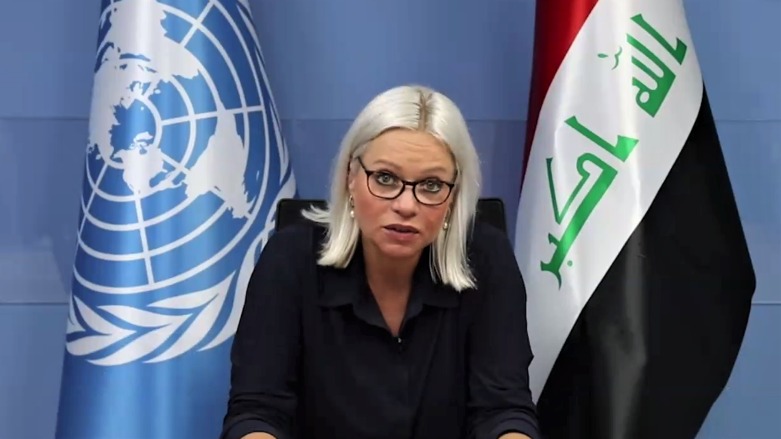UN Iraq envoy again calls for implementation of stalled Sinjar Agreement

ERBIL (Kurdistan 24) – The the head of the UN’s Iraq Assistance Mission (UNAMI), on Monday called again for the creation of a unified administration in the disputed district of Sinjar (Shingal) during an online event marking the seventh anniversary of the Yezidi (Ezidi) genocide, in which thousands were brutally murdered, kidnapped, and trafficked at the hands of ISIS.
“Years later, survivors, still face immense challenges, while they urgently need to rebuild their lives, unnecessary obstacles continue (…) on security arrangements, public service provision and unified, administration, and inability of parties and authorities to set aside differences for the greater good,” said Jeanine Hennis-Plasschaert during an online event organized by the Yezidi rights organization Yazda and the Zovighian Partnership.
In October 2020, Iraq and the Kurdistan Regional Government (KRG) announced they had reached an agreement, with support from the UN, to restore and normalize the situation in Shingal, where competing armed groups are active.
Read More: KRG and Baghdad reach administrative, security agreement on Sinjar
Notably, the agreement includes a framework to withdraw all armed groups from the area, restore the local administration, and appoint a new mayor. So far, however, these steps have not been taken.
Despite the agreement’s strong international backing, multiple armed groups remain, making the administrative piece of the agreement, to some degree, a moot point.
After a field visit to SInjar in January, Hennis-Plasschaert called for the stalled deal’s implementation, but there has been little clear progress since.
According to the envoy, Baghdad and Erbil “took an important step in the right direction, laying the groundwork for stability, improved safety and better living conditions,” but “progress has been unacceptably slow in improving governments and unifying administrations. And the harsh reality is that these roadblocks are holding progress hostage with the long suffering Sinjaris paying the price."
She explained that the UN is limited in its ability to force further action and can “only emphasize our readiness and commitment to help all stakeholders to move to a normalized, sustainable situation on the ground.”
Murad Ismael, the president and co-founder of both Yazda and the Sinjar Academy, said during the event that it was crucial to effectively address the ongoing presence of militias and other groups in SInjar, remarking that it was “one thing that I am worried about, and what I continue to worry about is armed conflict.”
Also on Monday, UN Deputy Special Representative for Iraq Ingibjorg Solrun Gisladottir, during a separate event of the Free Yezidi Foundation, advocated for inclusive consultation between “all the partners on a possible mayor candidate that is acceptable for all partners.”
She was sure to acknowledge that the road to such a goal would likely be problematic, not least of all because there won’t be a direct mayoral election in Sinjar for the foreseeable future.
Following ISIS’ 2017 ouster from Sinjar, Baghdad appointed new local officials in place of the officials who had withdrawn from the area to relocate to the Kurdistan Region’s Duhok province, where they still conduct official district business. There are, thus, currently two local governments for Sinjar: one appointed by Baghdad and the other elected before October 2017 by the people of the area.
“So, let's start to try to find a mayor candidate that all parties can accept, can live with, and we can take it from there,” Ismael said.
“As you know,” he concluded, “because it's so important to have one mayor, instead of two, and try to join forces to build up an administration in Sinjar.”
Editing by John J. Catherine